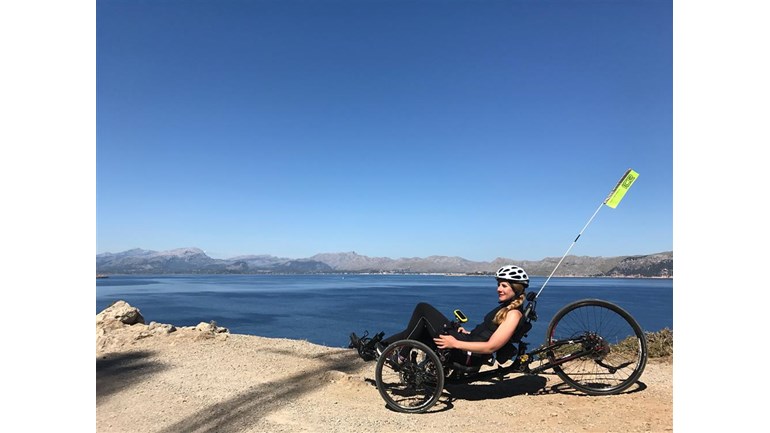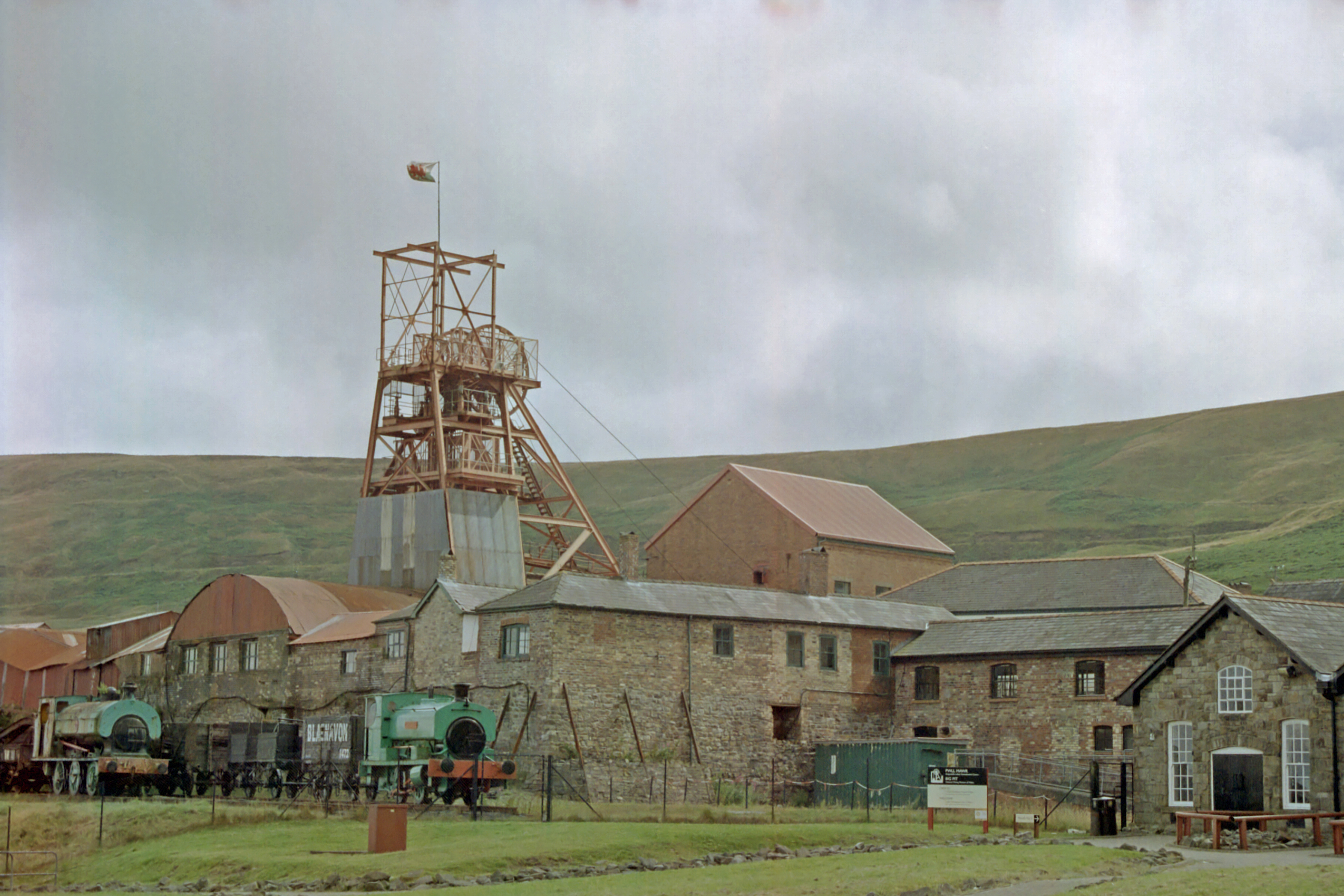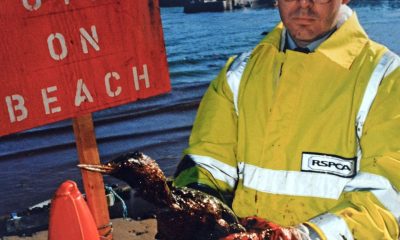News
Milford Haven: Natalie’s brave 5,000 mile cycle along the British coast

A FIVE THOUSAND mile cycle around the coast of Britain in just 91 short days would be a challenge for even the fittest of individuals. but for 29-year-old Natalie Wilson from Berkshire, it’s an even tougher challenge.
She suffers from Ehlers Danlos Syndrome, or EDS, a group of thirteen individual genetic conditions which affect the body’s connective tissues, causing pain and fatigue.
Having set off from her home town of Wokingham on February 24, Natalie cycled to Brighton, along the south coast, south west and into Wales.
5000 miles of coast, in only 91 days, and completely self supported.
On the 27 day of her extraordinary journey, the brave charity volunteer is in Milford Haven, braving the cold spring weather to bring awareness of her rare condition to our part of Wales, before she heads up north towards Aberystwyth.
Speaking to The Herald in Herbranston on Wednesday (Mar 21), Natalie, who spent the whole of January in hospital, said that the main reason for this extremely tough challenge was to raise awareness for people with EDS and other unseen disabilities, whatever kind.
“I want to tell people that it is still possible to do things, and this coast line is beautiful.”

Explaining that her tissue wasting syndrome has no treatment, she said that her cycle would also ‘help build up muscles’.
“As I cycle around the coast I am inviting people to come and join me, and ride along – even if you are in a wheelchair!
“I chose the name Zebra because I wanted to make people think that not everything is obvious. Something shaped like a horse, and something which sounds like a horse when it gallops is not necessarily a horse.
“When I first became unwell, if doctors had understood that I had EDS then they would have treatment me differently.”
Residents of Herbranston donated supplies to help Natalie on her way, and Mrs Absolon, landlady of the Taberna Inn, donated a free meal to Natalie to ensure she was well fed for the next leg of her journey.
Natalie told The Herald ‘the people here have been amazing’ as she hugged locals who had donated supplies.
Asked about the challenge of riding 5000 miles around Britain’s rugged coast, Natalie said: “This challenge is really tough, my body hurts, my leg muscles burn more than they have ever done before. I have battled all of the elements that have been thrown at me.
“I spend the majority of the time cold unless I am cycling up a steep gradient. I am tired from spending so many hours on my trike outdoors because I am slow and the miles are taking longer than expected. When I finish cycling for the day I spend hours planning, reading comments, writing my blog and trying to raise publicity.
“I haven’t been resting apart from the time I have spent asleep. As painful as all of this is, It is nothing compared to the pain I endured before and at the beginning of the diagnosis of the conditions I have. Nothing compared to the constant 8/10 headache I had for three years, and the frequent joint dislocation.”
She added: “”I am writing a daily blog, and people can follow me on my website – zebraonabike.co.uk”
You can donate to Natalie’s cause here.
About EDS
The Ehlers-Danlos syndromes (EDS) are a group of thirteen individual genetic conditions, all of which affect the body’s connective tissue. Connective tissue lies between other tissues and organs, keeping these separate whilst connecting them, holding everything in place and providing support, like the mortar between bricks. In EDS, a gene mutation causes a certain kind of connective tissue – the kind will depend on the type of EDS but usually a form of collagen – to be fragile and stretchy.
This stretchiness can sometimes be seen in the skin of someone with EDS; individuals with the condition may also be able to extend their joints further than is usual – this is known as being hypermobile, bendy or double-jointed. As collagen is present throughout the body, people with EDS tend to experience a broad range of symptoms, most of them less visible than the skin and joint differences.
These are complex syndromes affecting many systems of the body at once, despite this EDS is often an invisible disability. Symptoms commonly include, but are not limited to, long-term pain, chronic fatigue, dizziness, palpitations and digestive disorders. Such problems and their severity vary considerably from person to person, even in the same type of EDS and within the same family.
Climate
Communities offered share of £1bn energy fund — but questions remain over delivery

COMMUNITIES across Wales are being promised a stake in what ministers describe as the largest public investment in locally owned energy projects in British history, with up to £1 billion earmarked for solar panels, battery storage and small-scale renewable schemes.
The funding, announced this week by Great British Energy and the UK Government, forms part of a new “Local Power Plan” aimed at helping councils, schools, clubs and community groups generate and sell their own electricity.
Ministers say the approach will cut bills, create income streams and keep profits local rather than flowing to major energy companies.

However, while the headline figure is eye-catching, details about how much money will reach Wales — and how quickly — remain limited.
Welsh projects already backed
The government says nearly £9.5 million has already been allocated to projects in Wales over the past year, delivered with the Welsh Government.
Examples include rooftop solar on schools in Wrexham and Newport, and a new installation at Big Pit National Coal Museum in Pontypool, which is estimated to save more than £280,000 in energy costs over its lifetime.
A further scheme at a highways depot in Neath is projected to save the local authority around £910,000.
Energy Secretary Ed Miliband said the plan would “transfer wealth and power back to communities”, while Wales Secretary Jo Stevens described it as a way for towns and villages to “take charge of their own energy supplies”.
Big ambition — but funding spread thin
Despite the rhetoric, the £1bn pot is UK-wide and expected to support more than 1,000 projects across England, Scotland, Wales and Northern Ireland.
If split evenly, that would average around £1m per scheme — though ministers say grants and loans will vary and some funding will be reserved for advice and capability building rather than construction.
Community energy groups have long argued that red tape, grid connections and upfront costs are bigger barriers than ambition.
There are also questions over whether smaller volunteer-led organisations will have the technical expertise to compete for funds against better-resourced councils and developers.
Industry bodies broadly welcomed the move but stopped short of calling it transformational without clearer timelines.
What it could mean locally
If delivered effectively, the model could allow:
• village halls and sports clubs to reduce running costs
• schools to generate income from spare electricity
• councils to cut energy bills on public buildings
• residents to buy shares in local renewables
Supporters say that keeps money circulating in the local economy rather than leaving the area.
The announcement follows other energy developments affecting Wales, including backing for offshore wind in the Celtic Sea such as the Erebus Floating Offshore Wind Farm off Pembrokeshire.
Waiting for the detail
For now, communities are being invited to register interest via Great British Energy, with grant schemes expected to launch later this year.
Whether the plan proves to be a genuine shift in ownership or simply another competitive funding round will depend on how accessible the money is — and how much of it ultimately reaches places like Pembrokeshire rather than being absorbed at national level.
Local groups considering bids will be watching closely.
Charity
Donation gives Stackpole Quay book trailer fresh new look

A COMMUNITY donation will help spruce up a popular summer book trailer at Stackpole Quay after members of the Pembrokeshire National Trust Association handed over more than one thousand pounds to support the project.
The Pembrokeshire National Trust Association presented a cheque for £1,095 to the National Trust at Stackpole Quay this weekend.
The cheque was formally given to Rhian Sula, General Manager for the charity’s Pembrokeshire and Carmarthen Bay portfolio, by association chairman Jane Mason during a National Trust information coffee morning at the Stackpole Centre.
The money will be used to refurbish the well-known second-hand book trailer which operates at the quay during the summer months. The trailer allows visitors to pick up a holiday read while making a donation, with proceeds supporting local conservation and access projects.
Last year alone, the trailer raised more than £1,500.
Jane Mason said the association had originally funded the purchase of the trailer several years ago and wanted to build on its success.
“Our new donation from members’ support will improve the trailer with updated imagery and design,” she said. “This will help the National Trust present a more professional, welcoming and brand-aligned offer, and potentially grow donation income.”
The Pembrokeshire National Trust Association runs a programme of talks, visits and guided walks in support of local Trust properties. Membership of the National Trust is not required to join the association. Annual membership costs £5 for individuals and £8 for couples.
At its AGM in November, the group announced £3,000 in additional donations for local projects, including replacement willow hurdles at Tudor Merchants House, footpath improvements at Little Milford, and a new bench, tree planting and path works at Southwood.
With the latest contribution towards the book trailer, the association’s donations for the current financial year now exceed £4,000.
Photo caption:
Jane Mason presents a cheque for £1,095 to Rhian Sula at Stackpole Centre (Pic: supplied).
Crime
OAP admits stalking woman with emails, posters and letters

A HAVERFORDWEST man has admitted stalking a woman by sending repeated unwanted emails, putting up posters and contacting third parties about her.
Michael Lockheart, aged 80, of Daisy Lane, appeared before Haverfordwest Magistrates’ Court on Monday (Feb 9) for sentencing, having previously pleaded guilty to stalking.
The court heard that between July 27 and September 10 last year, Lockheart pursued a course of conduct which amounted to the stalking and harassment against a female.
His behaviour included sending numerous unwanted emails after being told to stop contact, distributing defamatory posters in public places, and sending malicious correspondence to her GP and the local authority.
Lockheart admitted the offence, contrary to Section 2A of the Protection from Harassment Act 1997.
Sentencing was adjourned to allow a pre-sentence report to be prepared.
He was granted conditional bail with strict restrictions. He must not contact the complainant directly or indirectly, including through third parties or social media, and must not enter any address where she lives.
Lockheart is due back before magistrates for sentence at 10:00am on Monday, March 9.
-

 Health5 days ago
Health5 days agoHealth board targets rise in steroid and gym drug use across west Wales
-

 Crime6 days ago
Crime6 days agoSex offender jailed after living off grid in Pembrokeshire and refusing to register
-

 Crime5 days ago
Crime5 days agoTeacher injured and teenager arrested for attempted murder at Milford Haven School
-

 Crime7 days ago
Crime7 days agoHakin man’s appeal delayed again as Crown Court seeks guidance on insurance law
-

 Business22 hours ago
Business22 hours agoComputer Solutions Wales under fire from customers
-

 Business4 days ago
Business4 days agoSix-figure negligence victory leaves retired builder trapped in divorce limbo
-

 Crime6 days ago
Crime6 days agoJohnston man remanded in custody over knife and assault charges
-

 Crime7 days ago
Crime7 days agoMan spared jail after admitting child abuse image offences




























